Overview
Coding challenges can often hinder developers' progress. The AI code orchestrator, Kodezi, addresses these issues by automating essential tasks such as:
- Bug fixing
- Test healing
- Documentation updates
This allows developers to focus on innovation rather than maintenance. Furthermore, Kodezi's features streamline processes, improve code quality, and significantly increase productivity. By utilizing Kodezi, developers can enhance their efficiency and output, making it a vital tool in modern software engineering. Explore the tools available on the platform to see how they can transform your development experience.
Introduction
In the realm of software development, coding hurdles can significantly impede progress and innovation. These challenges often frustrate developers, leading to delays and decreased productivity. However, the introduction of AI code orchestrators, such as Kodezi, presents a transformative opportunity. Kodezi enhances workflows by automating routine tasks like bug fixing, test healing, and documentation updates.
As teams increasingly seek solutions to streamline their processes, the question arises: how can these advanced tools redefine the future of software development? Kodezi empowers engineers to focus on what truly matters—innovation. By alleviating the burden of mundane tasks, developers can dedicate their time and expertise to creating high-quality code.
Furthermore, the benefits of using Kodezi extend beyond mere automation. Enhanced productivity and improved code quality are just the beginning. Imagine a development environment where engineers can collaborate more effectively, reduce errors, and accelerate project timelines. This is the future that Kodezi offers.
In addition, exploring the tools available on the Kodezi platform could be a game-changer for your team. Are you ready to elevate your coding practices? Discover how Kodezi can transform your development experience and help you achieve your goals.
Kodezi | Professional OpenAPI Specification Generator - AI Dev-Tool: Automate Code Maintenance and Quality Assurance
Coding challenges are a common hurdle for developers today. The OS serves as a professional OpenAPI specification generator that automates the upkeep and quality control of codebases. Unlike conventional tools that focus solely on generating scripts, Kodezi OS functions as an AI code orchestrator by continuously overseeing and managing the program after it has been created. This guarantees that the software remains organized, adheres to standards, and is prepared for deployment over time, addressing the typical obstacles faced by contemporary engineering teams.
How does Kodezi tackle these challenges? The incorporation of the AI code orchestrator in system management is revolutionizing the way teams maintain software quality. A significant portion of development teams now employs an AI code orchestrator for continuous software upkeep. Kodezi’s CLI independently enhances your codebase by promptly detecting and correcting issues, providing thorough explanations of what occurred and how it was resolved. This automated debugging capability not only boosts programming productivity but also ensures compliance with the latest security best practices and coding standards.
Consider the real-world applications of OpenAPI specification generators. For instance, JPMorgan Chase's implementation of generative AI for code review exemplifies the effectiveness of automated solutions in streamlining software development processes. By using Kodezi, developers can improve their productivity and ensure higher code quality. Why not explore the tools available on the platform and see how they can enhance your coding practices?
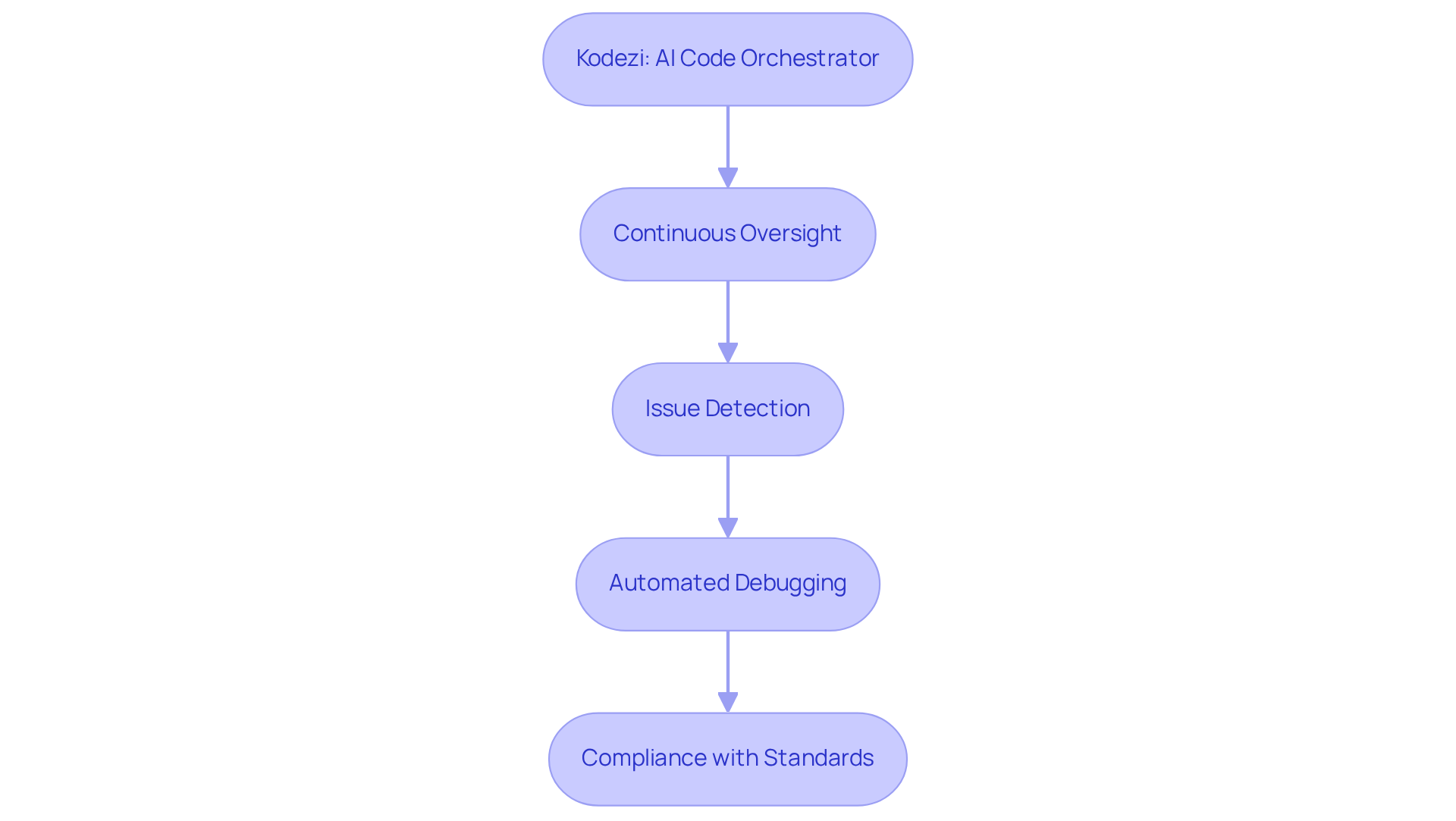
Bug Healing: Automatically Detect and Fix Issues in Real-Time
Developers often encounter significant challenges in maintaining code quality and troubleshooting issues. Kodezi OS addresses these pain points with its advanced bug healing mechanism, which automatically detects and fixes issues in real-time. By leveraging machine learning algorithms, Kodezi identifies problems as they arise, implementing solutions without the need for human intervention. This capability not only reduces the time developers spend on troubleshooting but also minimizes the risk of issues reaching production, thereby enhancing overall software reliability.
Moreover, the platform provides detailed insights into the nature of the bugs and the solutions applied, empowering developers with knowledge to avert future problems. In addition to this, Kodezi ensures that performance bottlenecks are resolved, security compliance is maintained, and formatting is optimized—all while safeguarding user privacy. This proactive approach to bug management illustrates how the operating system seamlessly integrates with existing development workflows, ensuring that software remains clean and compliant while adhering to high standards of quality.
With features such as automatic code correction and extensive insights into bug resolutions, Kodezi empowers programmers of all levels to boost their coding efficiency. Why struggle with coding challenges when Kodezi can streamline your development process? Explore the tools available on the platform and elevate your coding experience today.
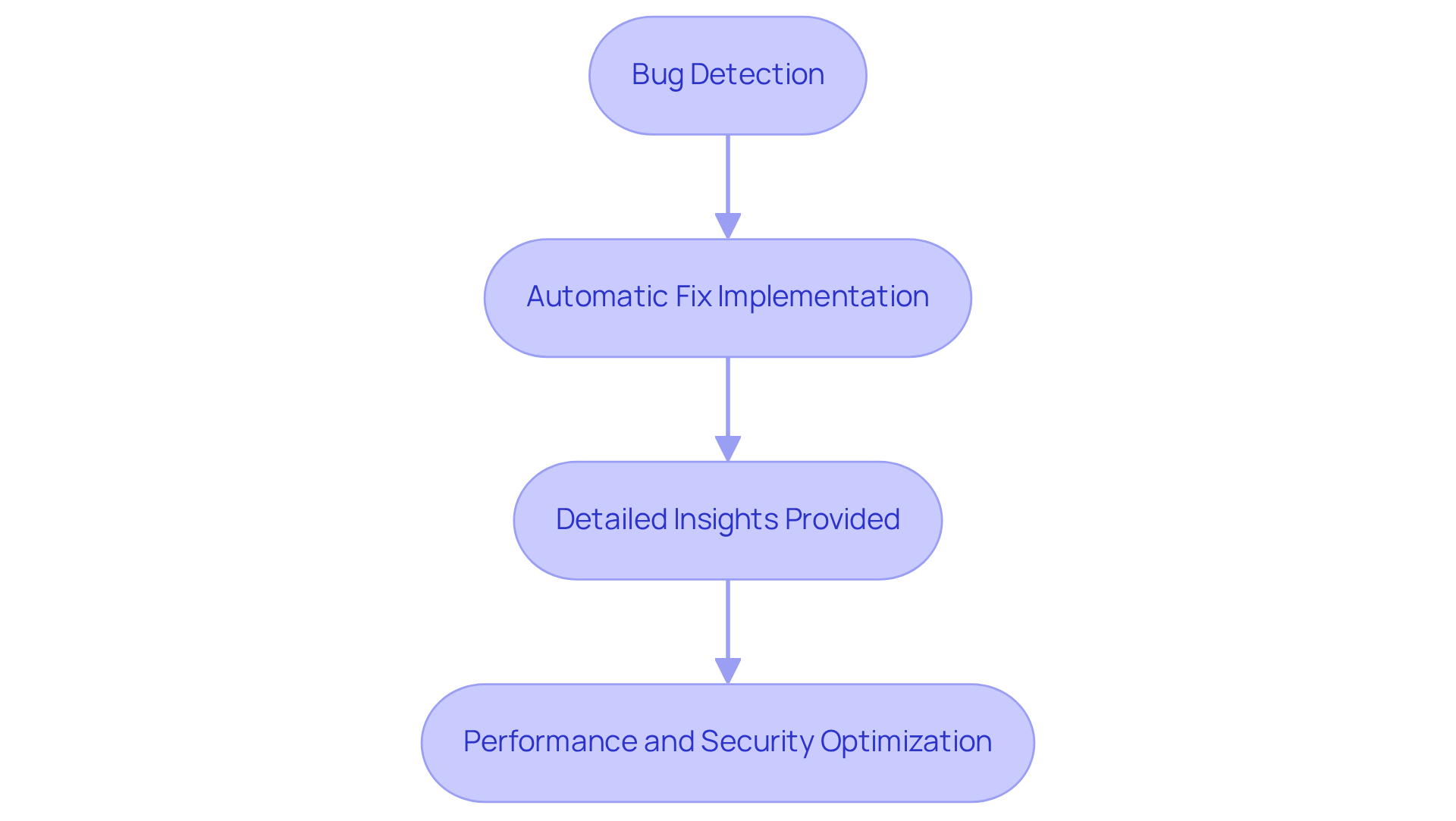
Test Healing: Rewrite Flaky Tests to Ensure Consistent Performance
Coding challenges are a common hurdle developers face, often leading to frustration and inefficiency. Test healing stands out as a pivotal feature of Kodezi, automatically rewriting unreliable tests to ensure consistent performance. By analyzing historical test data, the system identifies tests that frequently fail and applies corrective measures to stabilize them. This enhancement not only bolsters the reliability of the testing process but also allows developers to concentrate on writing new tests, rather than fixing existing ones.
Furthermore, the AI code orchestrator significantly elevates software quality throughout the development lifecycle by automating builds and testing procedures. By utilizing the CLI, B2B engineering groups can independently refine their codebases and resolve issues before production, thus optimizing the development process and increasing overall productivity. Imagine the time saved when your team can focus on innovation instead of troubleshooting—this is the power of Kodezi.
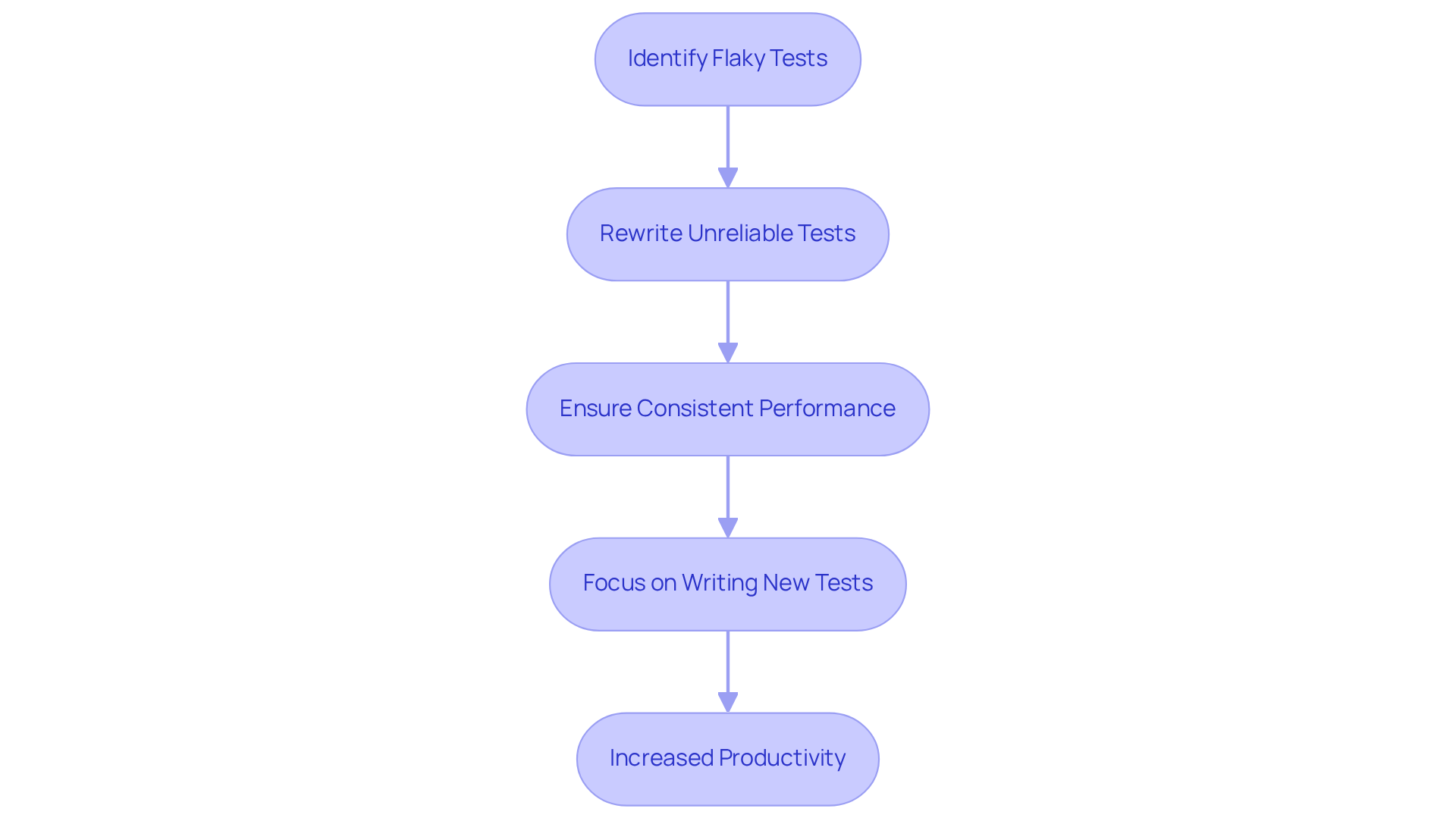
Documentation Sync: Auto-Update Project Docs to Reflect Code Changes
In the world of software development, one of the most significant challenges developers face is keeping project documentation in sync with code modifications. Kodezi addresses this issue by automating the synchronization process, ensuring that all documentation remains up-to-date and accurate. This functionality seamlessly updates README files, changelogs, and inline documentation in real-time as modifications occur within the codebase.
By maintaining consistently up-to-date documentation, teams can significantly enhance collaboration, leading to improved project outcomes. Furthermore, Kodezi's capability to generate OpenAPI specifications straight from the codebase simplifies the documentation process, making it easier to maintain precise API documentation. Did you know that standardized formats can reduce onboarding time for new developers by nearly 30%? This automation not only streamlines documentation updates but also facilitates a smoother acclimation process for newcomers.
Tech leads emphasize that maintaining precise records is essential for project success. One lead stated, 'Documentation is critical... cases will be decided based upon the evidence.' In an environment where inquiries are welcomed, team morale and engagement can improve by over 15%, underscoring the value of effective documentation practices in fostering a productive workplace.
Explore Kodezi's tools today and see how they can transform your coding experience.
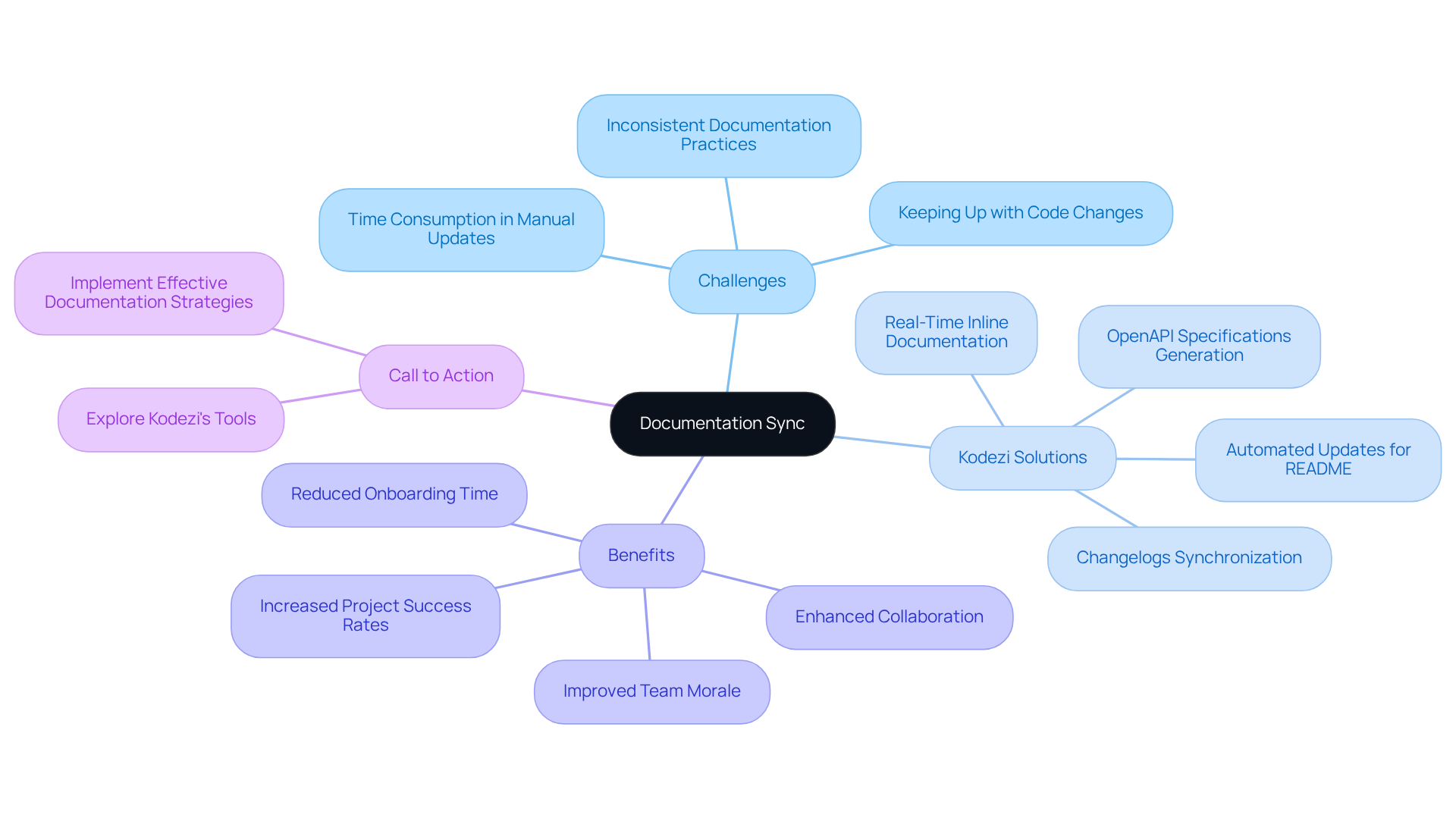
Entropy Detection: Identify and Manage Code Complexity and Risk Zones
Coding challenges can often lead to frustration for developers. Entropy detection is a powerful feature of Kodezi that addresses these issues by identifying areas of code complexity and potential risk zones. By analyzing the codebase, this tool highlights sections that may lead to maintenance challenges or technical debt. This proactive strategy allows teams to tackle complexity before it escalates into a major problem, ensuring that the codebase remains manageable and scalable.
Furthermore, the automated debugging functions of Kodezi enhance this process, enabling teams to quickly identify and resolve codebase problems, optimize performance, and improve security compliance. This thorough approach not only reduces risks but also empowers engineering groups to uphold high software quality and productivity. As a result, developers can expect smoother deployments and integrations.
In addition, to maximize the advantages of Kodezi's functionalities, teams should consistently employ entropy detection alongside automated debugging. This proactive handling of complexity in programming not only streamlines workflows but also fosters a culture of continuous improvement. Are you ready to explore the tools available on the Kodezi platform and elevate your coding practices?
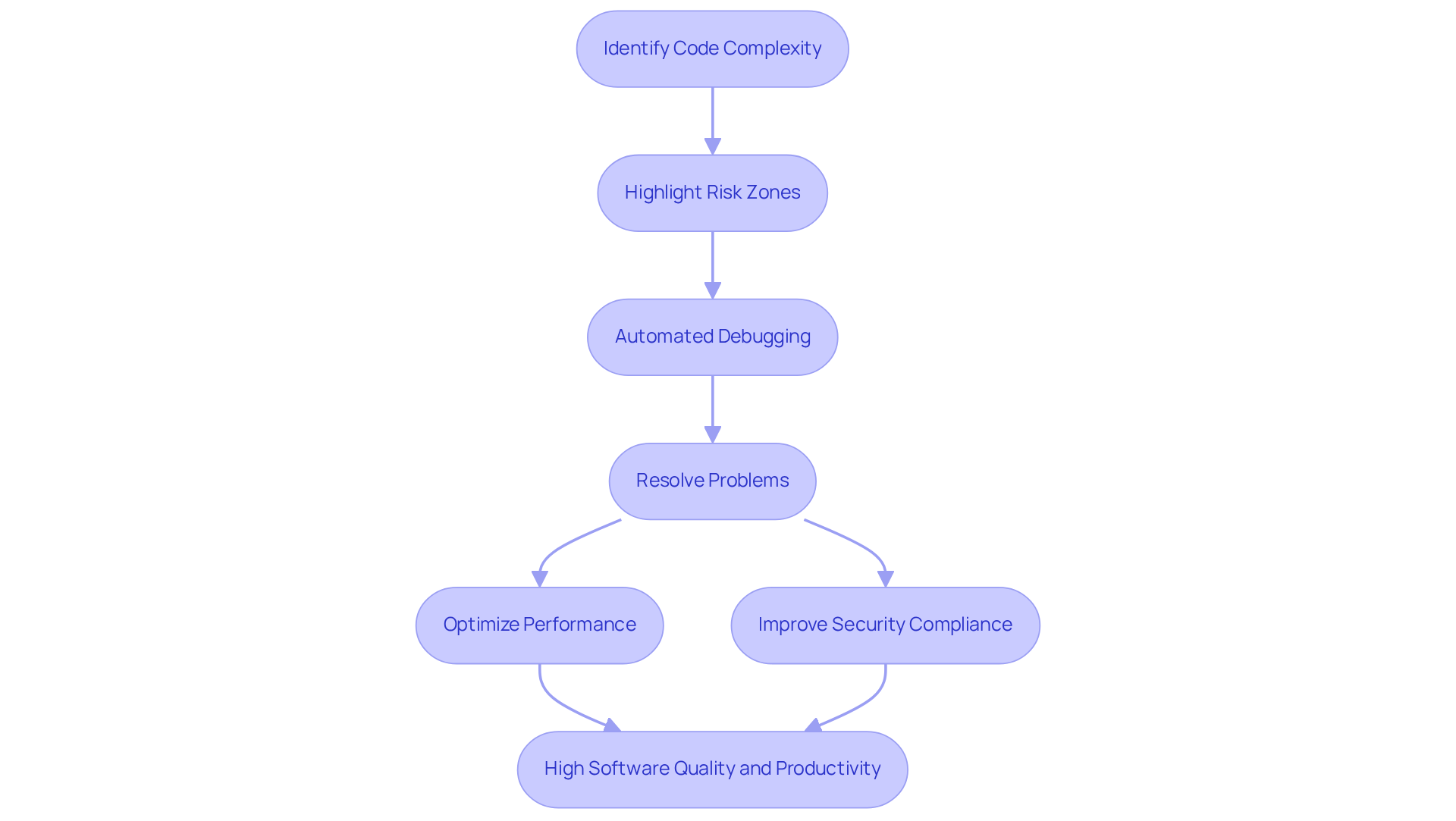
Slack + GitHub Integration: Enhance Team Collaboration with Automated Insights
Coding can be challenging, especially when developers struggle to keep track of changes and updates. Kodezi OS addresses these issues by effortlessly connecting with Slack and GitHub, providing automated insights and updates directly within communication channels. This integration empowers developers by delivering real-time notifications about code changes, bug fixes, and documentation updates. Consequently, teams can react promptly to arising problems, ensuring that everyone stays coordinated and informed.
Furthermore, the ability to streamline communication fosters a more efficient workflow. It contributes to a collaborative environment where project success becomes more achievable. In fact, collaborative teams are 33% more likely to complete projects on time, underscoring the critical role of effective communication in software development. Why not explore the tools available on the Kodezi platform to enhance your team's productivity and code quality?
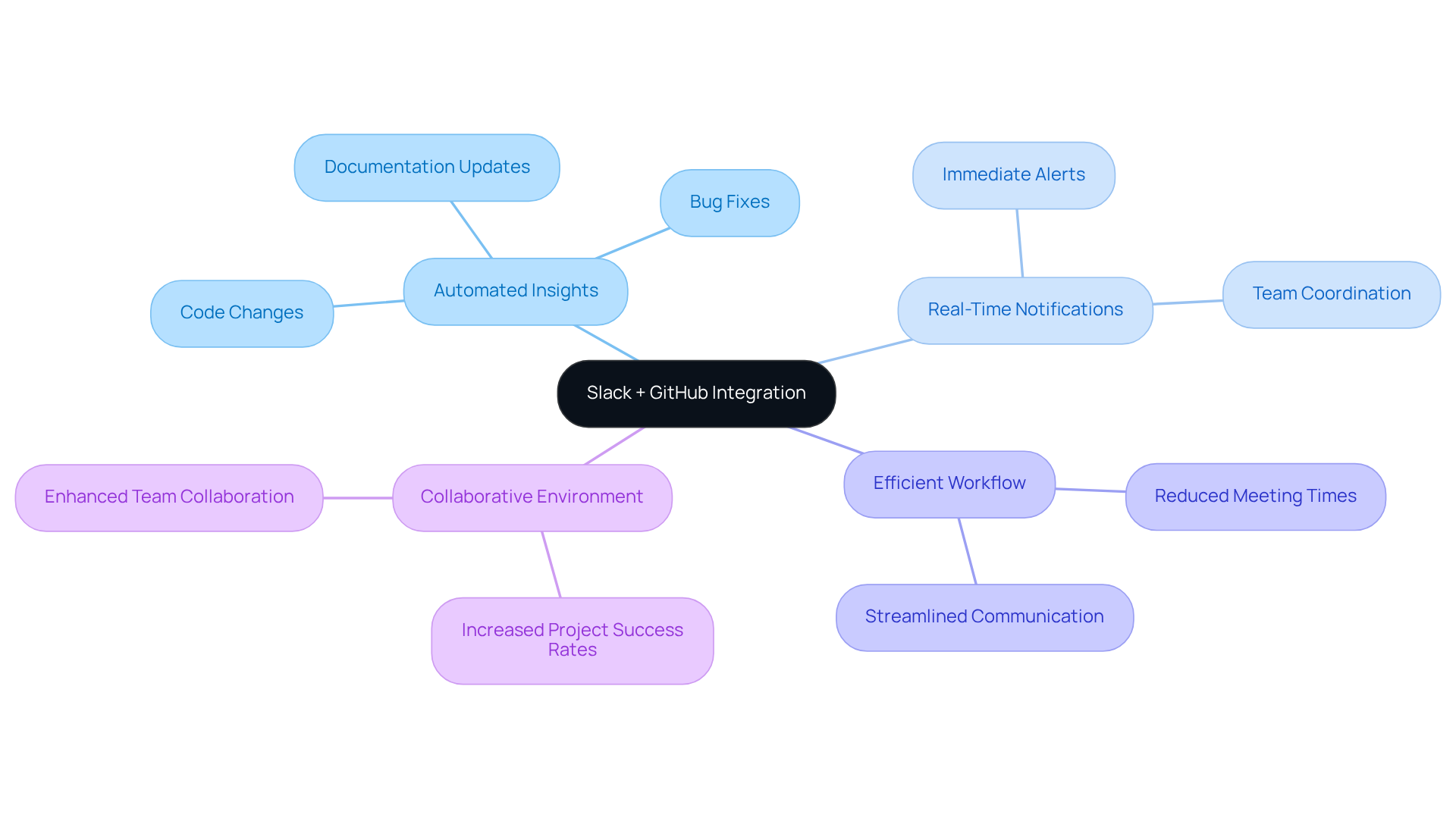
Self-Healing Infrastructure: Build Long-Term Maintainability into Your Code
Coding challenges are a significant hurdle for developers today. Self-healing infrastructure emerges as a transformative solution within operating systems, enabling systems to independently identify and rectify problems without human intervention. By leveraging historical data and machine learning, these systems can detect potential failures and automatically apply corrective actions. This capability not only enhances system reliability but also alleviates the burden on development teams, allowing them to concentrate on strategic initiatives rather than routine maintenance.
Furthermore, the Command Line Interface (CLI) enhances this process by independently refining codebases and resolving issues before deployment, ensuring that quality is maintained. Organizations that utilize autonomous issue resolution have reported a notable decrease in downtime and operational expenses. In fact, 54% of assessed codebases in 2022 incorporated open-source elements with licensing conflicts, which this solution effectively manages.
For example, Rachel Hume, VP of Engineering at Upnova, remarked, 'The tool identified bugs, addressed unstable tests, and improved our legacy code, such as adding a senior engineer to every repository.' As we approach 2025, the trend towards self-healing technologies is expected to grow. This specific operating system exemplifies this shift by ensuring that codebases remain clean, compliant, and ready for future challenges, while also enhancing performance and security adherence.
Are you ready to explore how self-healing infrastructure can transform your development processes? Discover the tools available on the platform that can help you achieve improved productivity and code quality.
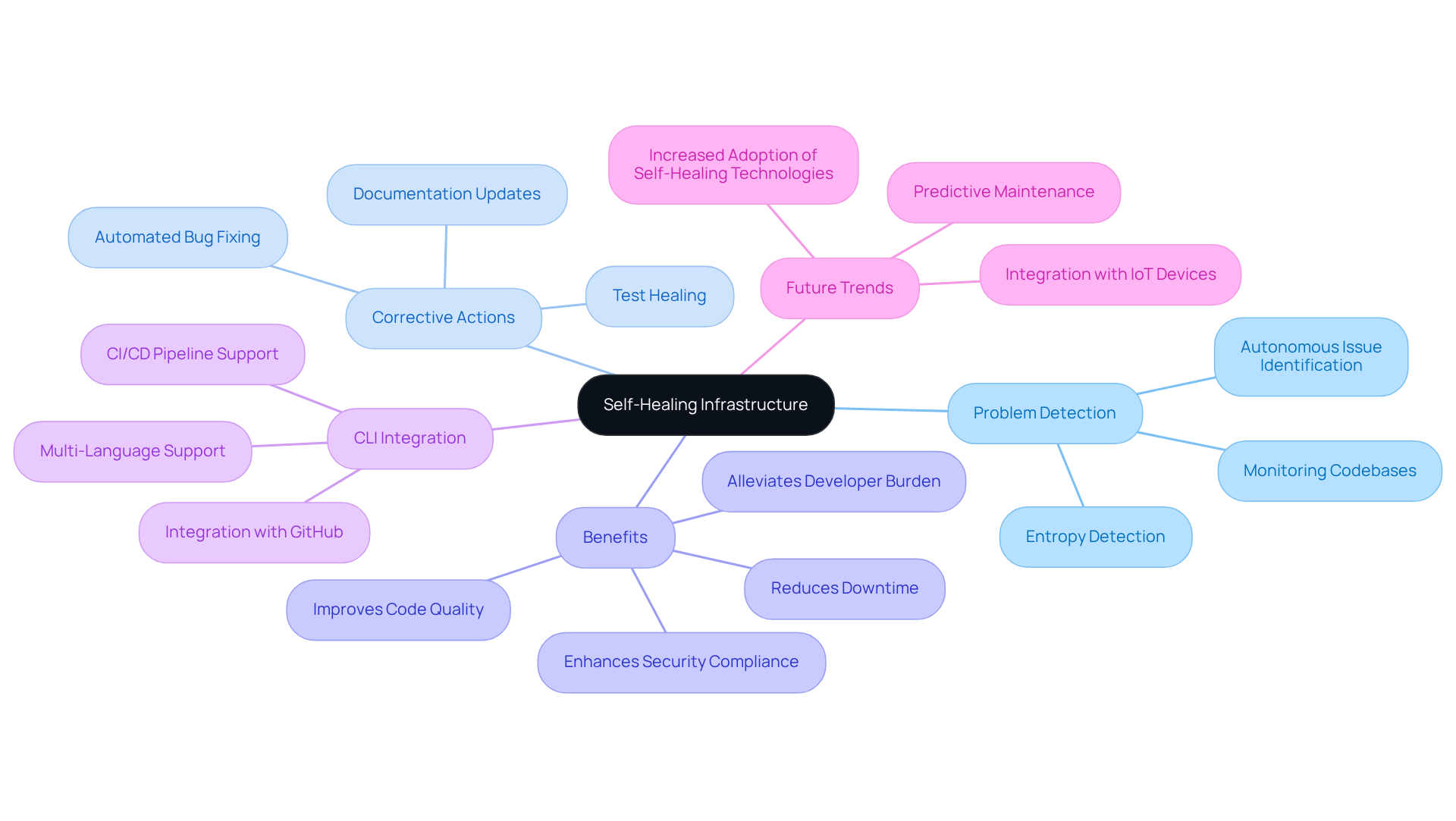
Security & Standards: Automatically Enforce Code Compliance and Vulnerability Detection
In today's coding landscape, developers face significant challenges, particularly concerning security vulnerabilities. The operating system incorporates advanced security and standards enforcement capabilities that autonomously identify these vulnerabilities and ensure adherence to coding standards. By continuously monitoring the codebase for potential security threats, it empowers teams to tackle issues proactively, preventing them from escalating into significant problems. This vigilant approach is crucial for safeguarding user trust and protecting sensitive data, especially in an environment where 74% of commercial codebases contain high-risk open source vulnerabilities.
Furthermore, as automated compliance checks grow more essential, this operating system distinguishes itself by not only identifying vulnerabilities but also enabling prompt remediation. This capability significantly enhances overall software security and compliance, particularly as we look toward 2025. By using this operating system, teams can improve their productivity and code quality, ensuring their projects are not only efficient but also secure. Are you ready to elevate your coding practices and protect your projects from potential threats?
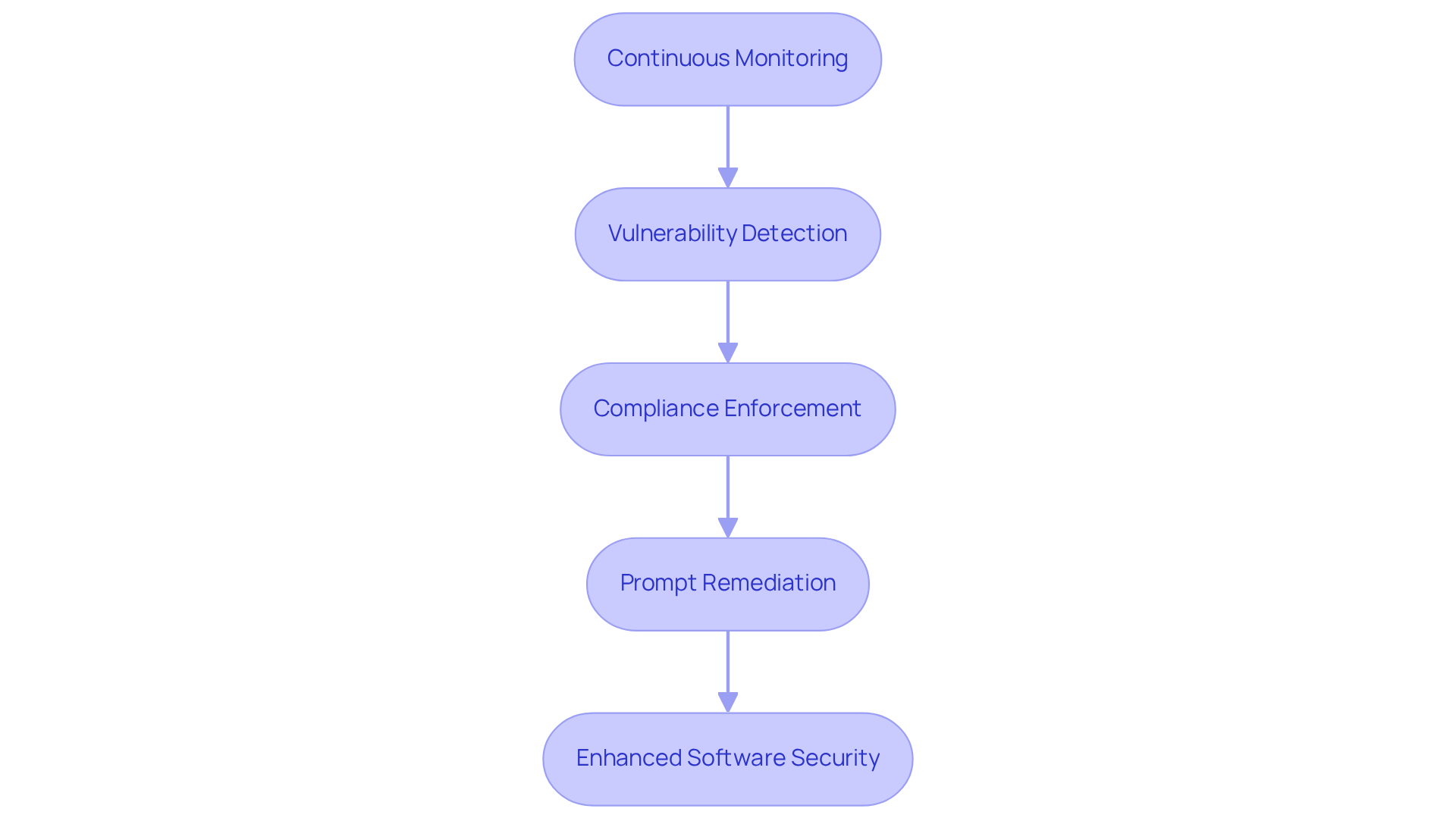
Language & Framework Translation: Seamlessly Convert Code Between Different Stacks
Developers often encounter significant challenges when managing code across various programming languages and frameworks. The operating system addresses these hurdles with robust language and framework translation capabilities, allowing teams to effortlessly convert code. This functionality is invaluable for those managing diverse projects or transitioning legacy systems to modern technology stacks.
Furthermore, by streamlining the translation process, this operating system enables developers to focus on feature creation rather than compatibility issues. In fact, studies indicate that effective programming translation tools can significantly reduce the time and effort required for migration tasks, achieving over 90% accuracy in many scenarios. Developers have observed that while software compatibility can be daunting, tools like this platform simplify the process, enhancing productivity and fostering innovation.
As one developer noted, 'The capability to effortlessly convert programming between languages is a game changer, enabling us to utilize existing systems without the typical hassles.' With this operating system, the challenges of code transformation are handled effectively, allowing teams to concentrate on delivering high-quality software. Why not explore the tools available on this platform and see how they can improve your coding practices?
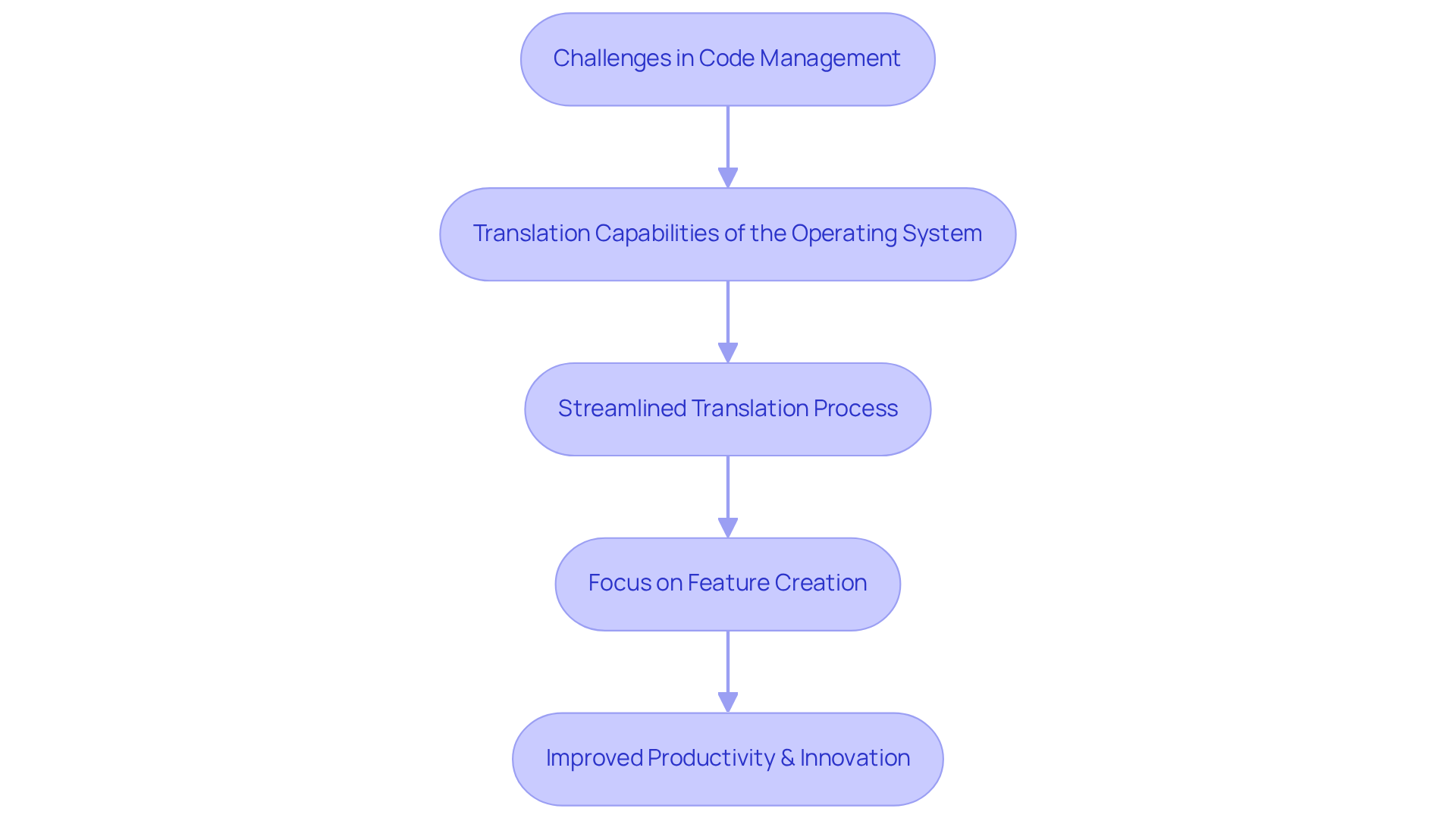
Kodezi OS: Your Autonomous Partner for Efficient Software Development
In the fast-paced world of software development, coding challenges can often hinder progress. Kodezi emerges as a pivotal autonomous partner, functioning as an AI code orchestrator to address these challenges by automating essential tasks such as:
- Bug fixing
- Test healing
- Documentation updates
- Security checks
This allows engineering teams to shift their focus from maintenance to innovation. Such a shift is crucial; studies indicate that automation can reduce feedback response times to developers by up to 80%, significantly enhancing productivity. Furthermore, organizations utilizing an AI code orchestrator report substantial improvements in application quality, with 60% observing better results from their automation initiatives.
The platform boasts comprehensive features, including:
- Automated code debugging
- Bug healing
- Test healing
- Documentation sync
These capabilities not only elevate code quality but also ensure long-term maintainability, addressing the growing complexity of modern codebases. The tool's ability to quickly identify and resolve codebase issues, while providing thorough explanations and insights into what occurred and how it was rectified, enhances performance optimization and security compliance. In addition, as the adoption of continuous testing surged from 16% to over 50% in 2025, Kodezi distinguishes itself by seamlessly integrating with existing workflows, solidifying its role as an essential resource for any development group.
In a landscape where 79% of companies using test automation express satisfaction with their ROI, Kodezi OS serves as an AI code orchestrator, positioning itself as a leader in fostering a culture of efficiency and innovation within engineering teams. Are you ready to explore how Kodezi can transform your coding practices and elevate your team's productivity? Discover the tools available on the platform and experience the benefits firsthand.
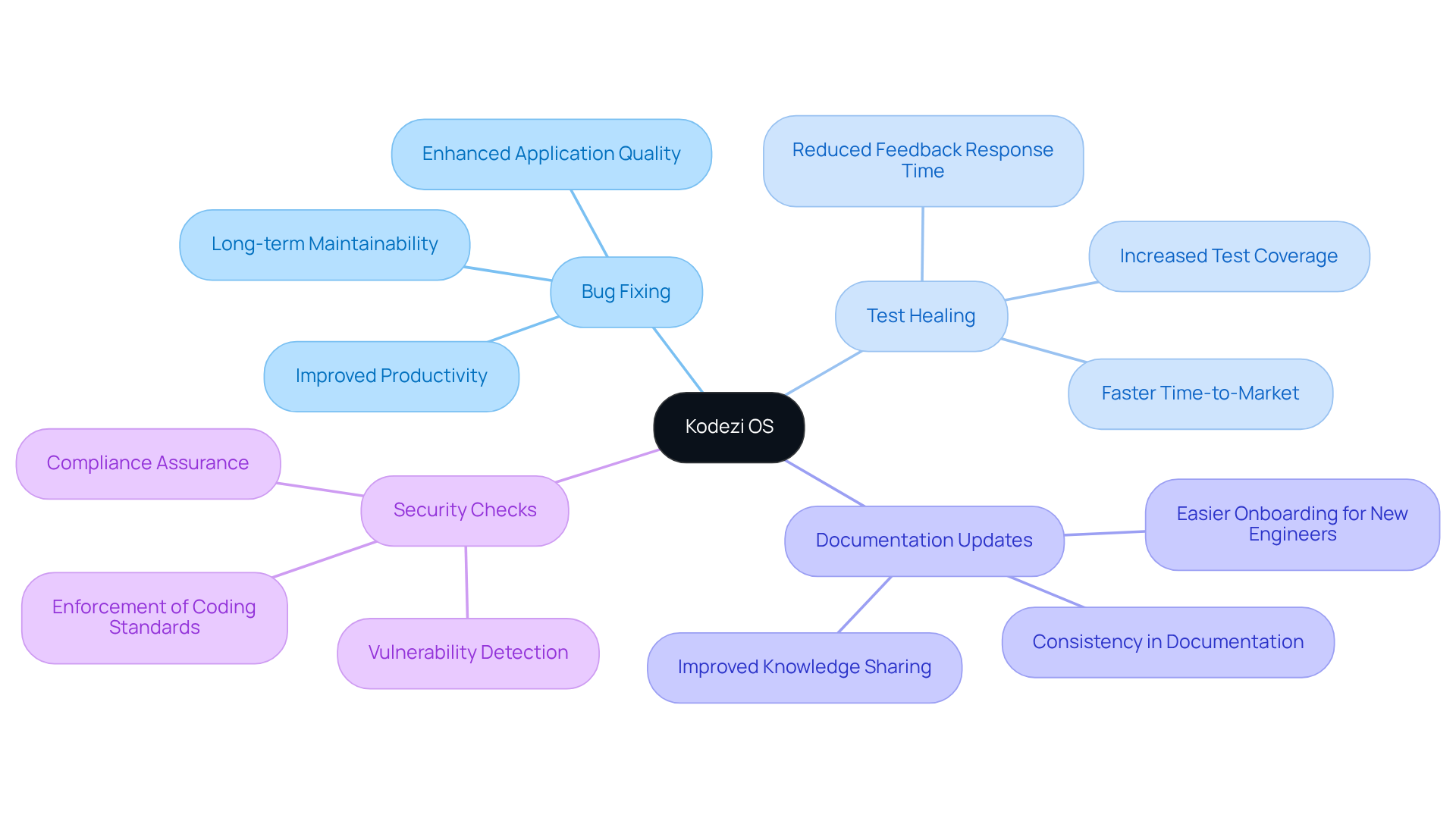
Conclusion
In the realm of software development, developers often face significant coding challenges that can hinder progress. Enter Kodezi, an AI code orchestrator that is transforming the way teams approach these obstacles. By automating critical processes such as bug fixing, test healing, and documentation updates, Kodezi allows developers to shift their focus from maintenance to innovation. This transformation not only enhances productivity but also ensures that software remains high-quality and compliant with the latest standards.
Kodezi boasts several key features designed to tackle these challenges head-on:
- Real-time bug detection and automatic code corrections significantly reduce troubleshooting time, making it easier for teams to stay on track.
- The platform’s capabilities in documentation synchronization and entropy detection help maintain clarity and manage code complexity.
- The integration of tools like Slack and GitHub enhances team collaboration, ensuring that developers remain informed and coordinated throughout their projects.
As the software development landscape continues to evolve, embracing AI-driven solutions like Kodezi becomes imperative for teams aiming to improve efficiency and uphold high-quality standards. By leveraging these advanced tools, organizations can streamline their coding practices while fostering a culture of continuous improvement and innovation. So, why not explore the capabilities of Kodezi? Doing so could lead to significant advancements in both productivity and code quality, positioning your team for success in an increasingly complex environment.
Frequently Asked Questions
What is Kodezi and how does it function?
Kodezi is a professional OpenAPI specification generator that automates code maintenance and quality assurance. It functions as an AI code orchestrator, continuously overseeing and managing codebases to ensure they remain organized, adhere to standards, and are ready for deployment over time.
How does Kodezi address coding challenges faced by developers?
Kodezi incorporates an AI code orchestrator for continuous software upkeep, enhancing codebases by detecting and correcting issues promptly. It provides thorough explanations of the problems and their resolutions, which boosts productivity and ensures compliance with security best practices and coding standards.
Can you provide an example of Kodezi's effectiveness in real-world applications?
An example is JPMorgan Chase's use of generative AI for code review, which demonstrates how automated solutions like Kodezi can streamline software development processes and improve productivity and code quality.
What is the bug healing feature of Kodezi?
The bug healing feature automatically detects and fixes issues in real-time using machine learning algorithms. This reduces the time developers spend on troubleshooting and minimizes the risk of issues reaching production, thus enhancing overall software reliability.
How does Kodezi empower developers in terms of bug management?
Kodezi provides detailed insights into the nature of bugs and the solutions applied, helping developers learn how to prevent future problems. It also resolves performance bottlenecks, maintains security compliance, and optimizes formatting while safeguarding user privacy.
What is test healing and how does it work in Kodezi?
Test healing is a feature that automatically rewrites flaky tests to ensure consistent performance. By analyzing historical test data, Kodezi identifies tests that frequently fail and applies corrective measures to stabilize them, allowing developers to focus on writing new tests instead of fixing existing ones.
How does Kodezi enhance the overall development process?
Kodezi automates builds and testing procedures, allowing engineering teams to refine their codebases independently and resolve issues before production. This optimization increases overall productivity and enables teams to focus on innovation rather than troubleshooting.




